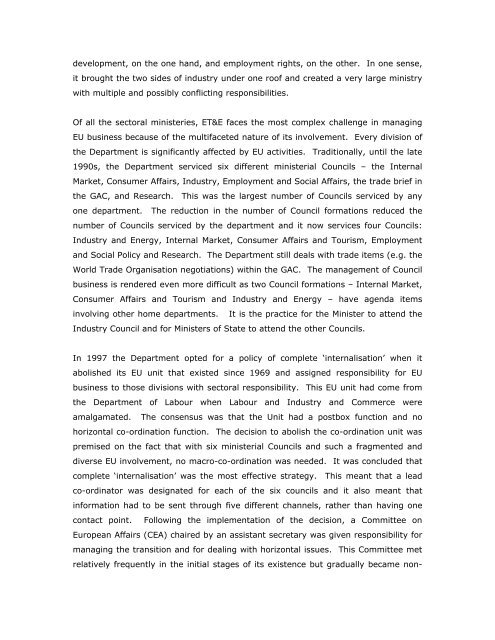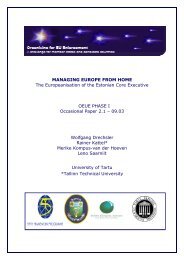Managing Europe From Home: The Europeanisation of the Irish ...
Managing Europe From Home: The Europeanisation of the Irish ...
Managing Europe From Home: The Europeanisation of the Irish ...
You also want an ePaper? Increase the reach of your titles
YUMPU automatically turns print PDFs into web optimized ePapers that Google loves.
development, on <strong>the</strong> one hand, and employment rights, on <strong>the</strong> o<strong>the</strong>r. In one sense,<br />
it brought <strong>the</strong> two sides <strong>of</strong> industry under one ro<strong>of</strong> and created a very large ministry<br />
with multiple and possibly conflicting responsibilities.<br />
Of all <strong>the</strong> sectoral ministeries, ET&E faces <strong>the</strong> most complex challenge in managing<br />
EU business because <strong>of</strong> <strong>the</strong> multifaceted nature <strong>of</strong> its involvement. Every division <strong>of</strong><br />
<strong>the</strong> Department is significantly affected by EU activities. Traditionally, until <strong>the</strong> late<br />
1990s, <strong>the</strong> Department serviced six different ministerial Councils – <strong>the</strong> Internal<br />
Market, Consumer Affairs, Industry, Employment and Social Affairs, <strong>the</strong> trade brief in<br />
<strong>the</strong> GAC, and Research. This was <strong>the</strong> largest number <strong>of</strong> Councils serviced by any<br />
one department. <strong>The</strong> reduction in <strong>the</strong> number <strong>of</strong> Council formations reduced <strong>the</strong><br />
number <strong>of</strong> Councils serviced by <strong>the</strong> department and it now services four Councils:<br />
Industry and Energy, Internal Market, Consumer Affairs and Tourism, Employment<br />
and Social Policy and Research. <strong>The</strong> Department still deals with trade items (e.g. <strong>the</strong><br />
World Trade Organisation negotiations) within <strong>the</strong> GAC. <strong>The</strong> management <strong>of</strong> Council<br />
business is rendered even more difficult as two Council formations – Internal Market,<br />
Consumer Affairs and Tourism and Industry and Energy – have agenda items<br />
involving o<strong>the</strong>r home departments. It is <strong>the</strong> practice for <strong>the</strong> Minister to attend <strong>the</strong><br />
Industry Council and for Ministers <strong>of</strong> State to attend <strong>the</strong> o<strong>the</strong>r Councils.<br />
In 1997 <strong>the</strong> Department opted for a policy <strong>of</strong> complete ‘internalisation’ when it<br />
abolished its EU unit that existed since 1969 and assigned responsibility for EU<br />
business to those divisions with sectoral responsibility. This EU unit had come from<br />
<strong>the</strong> Department <strong>of</strong> Labour when Labour and Industry and Commerce were<br />
amalgamated. <strong>The</strong> consensus was that <strong>the</strong> Unit had a postbox function and no<br />
horizontal co-ordination function. <strong>The</strong> decision to abolish <strong>the</strong> co-ordination unit was<br />
premised on <strong>the</strong> fact that with six ministerial Councils and such a fragmented and<br />
diverse EU involvement, no macro-co-ordination was needed. It was concluded that<br />
complete ‘internalisation’ was <strong>the</strong> most effective strategy. This meant that a lead<br />
co-ordinator was designated for each <strong>of</strong> <strong>the</strong> six councils and it also meant that<br />
information had to be sent through five different channels, ra<strong>the</strong>r than having one<br />
contact point. Following <strong>the</strong> implementation <strong>of</strong> <strong>the</strong> decision, a Committee on<br />
<strong>Europe</strong>an Affairs (CEA) chaired by an assistant secretary was given responsibility for<br />
managing <strong>the</strong> transition and for dealing with horizontal issues. This Committee met<br />
relatively frequently in <strong>the</strong> initial stages <strong>of</strong> its existence but gradually became non-



